Immigrant-Owned Businesses Were Hardest Hit by Covid, but a Sliver of Hope Lies in Greenpoint’s ‘La Merced’
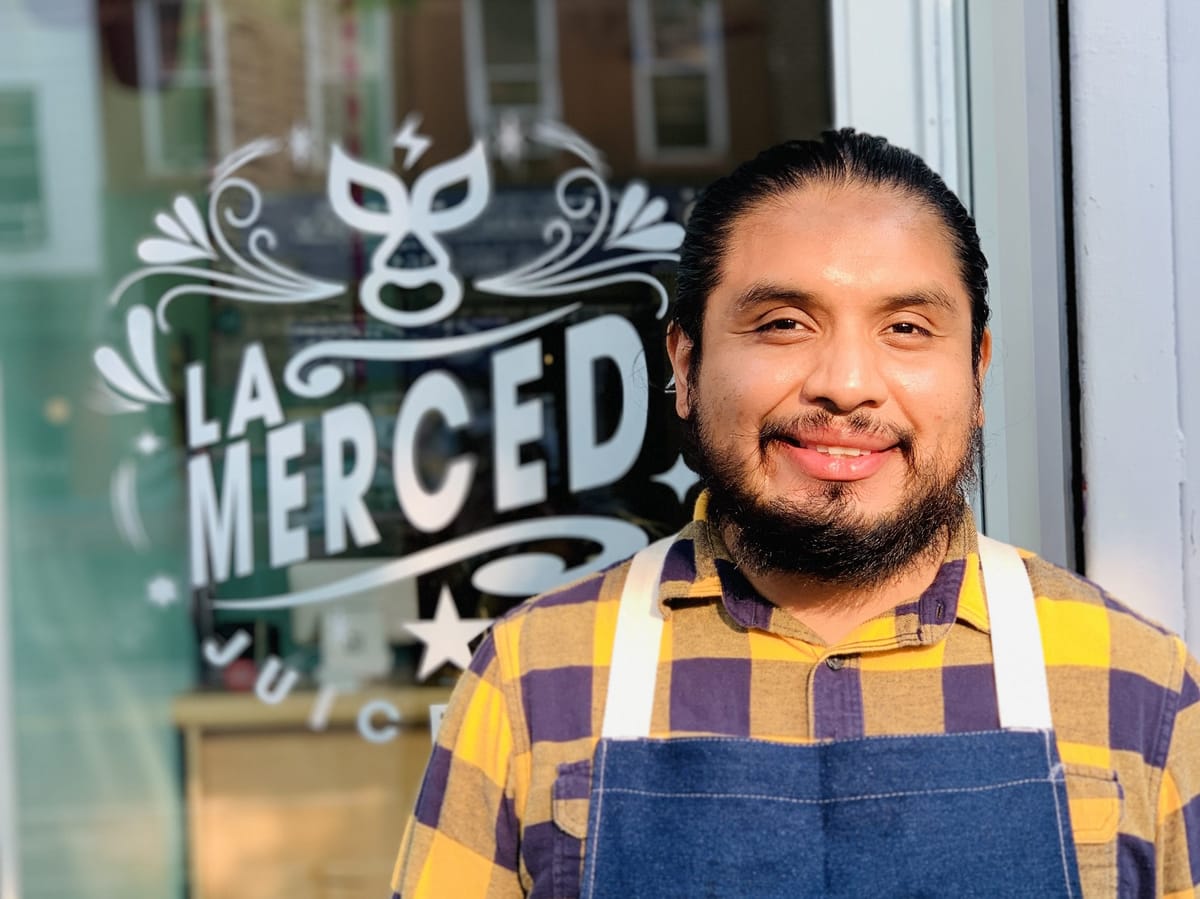
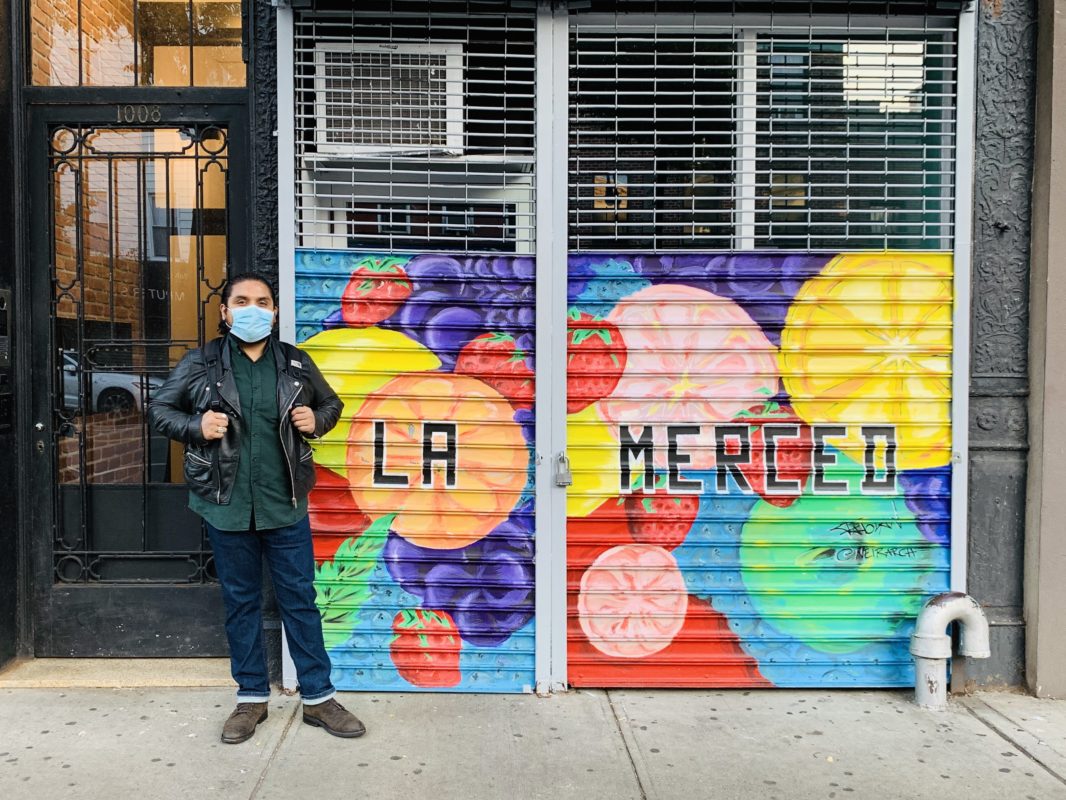
Greenpoint’s La Merced Juice Bar, named after a marketplace in Mexico City, opened to the public in September— just weeks after dozens of neighborhood businesses had shut down for good. Founder and owner Ricardo Rodriguez Pacheco, who’s from Mexico City, felt it was perfect timing, still.
“Yes, it’s a pandemic but…this is not going to be forever,” Pacheco explained, leaning over a basket of pineapples — one of many fruit-filled hampers adorning the shop. His decade-long dream has been to open his own fruit-forward business, inspired by his mother’s former puesto, or fruit stand, in Mexico. “This pandemic actually helped me to develop the business plan, ask what do I really want, [and] what do I want to give as well.”
“People still need to eat,” noted Glamis Haro, Senior Business Advisor at Columbia Business School’s Small Business Development Center. During the pandemic, businesses serving peoples’ basic needs at home have often boomed.
Pacheco’s optimism for life, love of people, and passion for agua fresca are expressed in La Merced’s decor: Lustrous turquoise walls envelop the room, and wooden crates filled with fresh fruit surround the register. La Merced’s logo is the infamous luchador. The storefront, with its location between a yoga studio and hair salon, plays a trick on the mind: Suddenly, you’re at a fruit stand in Mexico City — except you’re placing your order on a touch screen from which you can purchase everything from acai bowls to chia pudding to “El Vampiro” (apple, beet, and lemon juice).
Pacheco is not the only Latinx immigrant opting to start anew amid the pandemic. According to Haro, many immigrant-owned businesses are closing, but lots are opening. “Not everything is bad: as storefronts are being emptied out, other small businesses are popping up,” she notes. “They’re just not as big as they were before, [and] it’s more ‘to go’ style,” just like La Merced, hopefully foreshadowing a successful future.
Drinking a smoothie, Pacheco explains that, aside from making it through the pandemic, his main goal with La Merced is “to bring a piece of Mexico to [Brooklyn].”
“The first thing [Ricardo] said to me was that he wanted to open his own place,” recalls Claudia Rincon, Ricardo’s business partner and marketing manager. She also works as Marketing Director at the Fort Greene and Clinton Hill Business Improvement District when she’s not at the juice bar. “The day he asked me to help him, I was happy that he finally was making his dream [come true], but I was worried because of the pandemic. I asked a lot of questions, [but] when I saw his eyes, I could see how much he wanted this.”
Despite Pacheco’s positivity and passion, the path to opening La Merced was a difficult one.
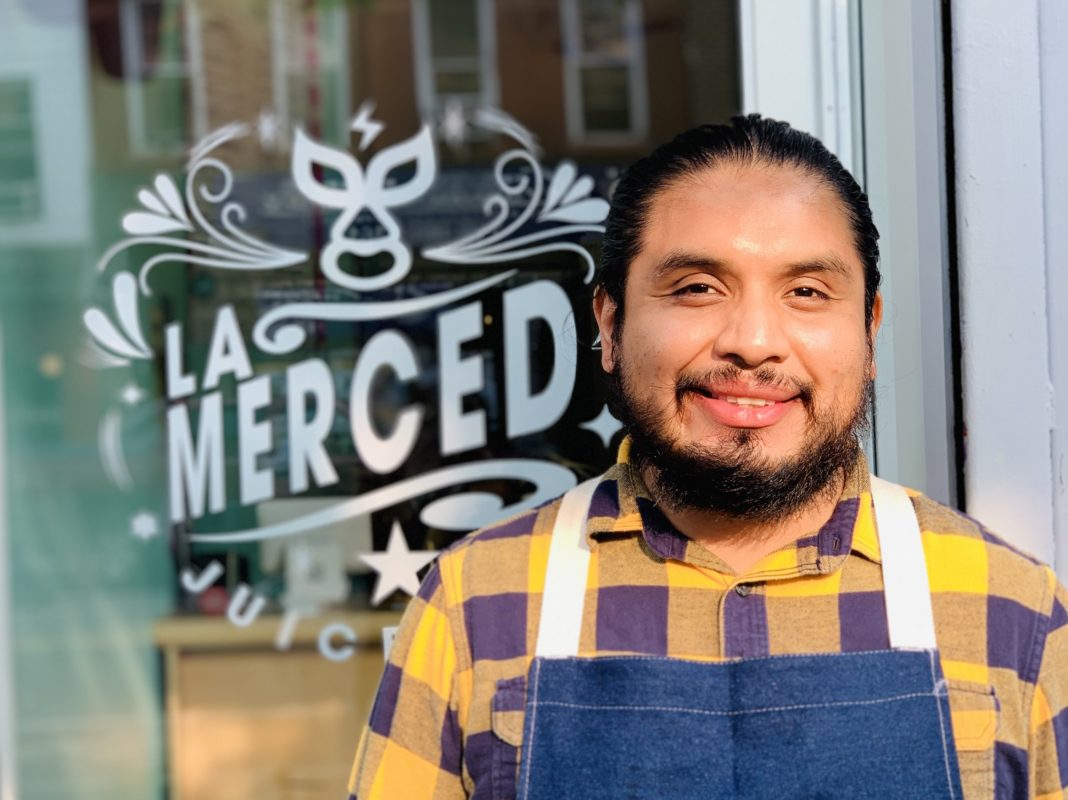
Pacheco was born in Mexico City, the youngest of two sons — his father, a city native, his mother from Oaxaca. “There was always agua fresca, fruit, everything fresh,” Pacheco remembers assisting his mother with her puesto however he could. “I was always around fruit,” he laughs, still blissfully surrounded by fruit twenty years later in Brooklyn.
At the age of eleven, however, Pacheco’s life turned upside down when his parents decided to move to New York City.
They settled into Astoria, Queens, one of New York City’s most prominent Mexican enclaves. “We felt comfortable there,” Pacheco recalls, but still, the transition was difficult, as they struggled to adjust to the language barriers, even in a majority Latinx neighborhood. Pacheco’s parents encouraged their sons to persevere. Pacheco’s father worked night shifts at a local supermarket providing financial support, while his mother stayed home, translating her sons’ school work from English to Spanish with a dictionary until their father returned at sunrise to take them to school.
“It was really hard,” Pacheco says of the transitional period. “I couldn’t communicate [with] friends or my teachers. And [I was] new, [I didn’t] know what’s happening. It was a big change, but it was something that also helped me to improve myself and just learn.”
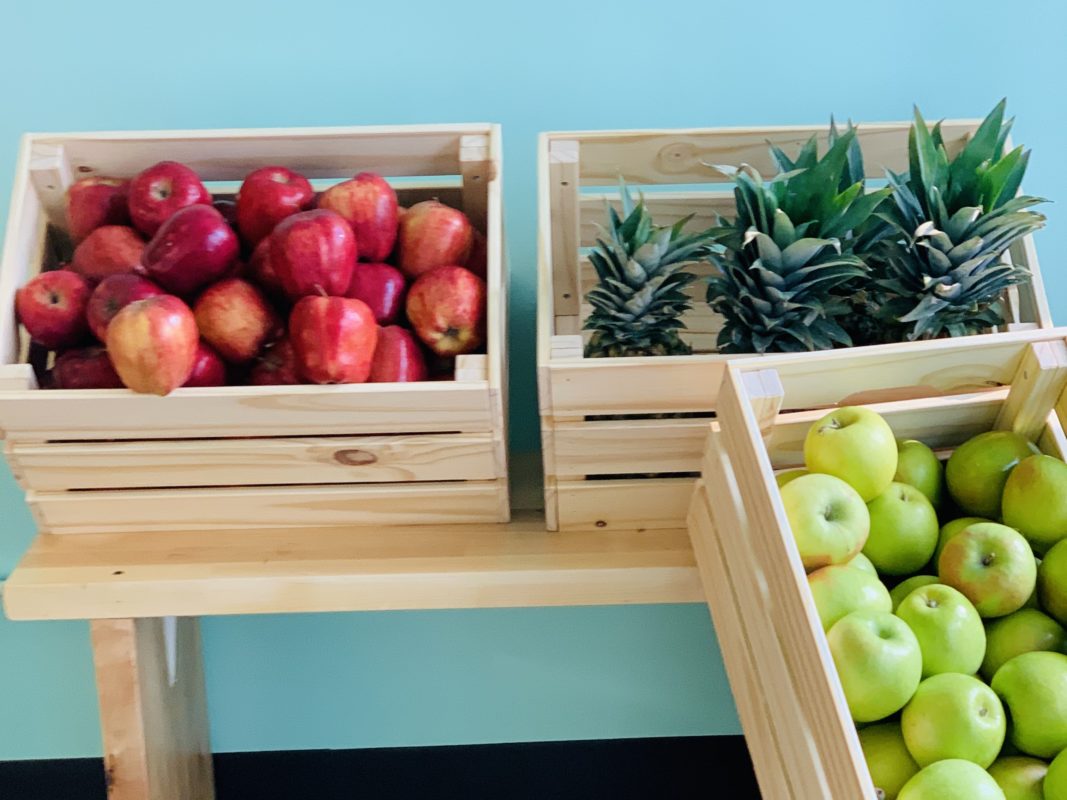
Pacheco sought out ESL tutorials and workshops to master English, eventually learning enough to get through school and start working. At seventeen, Pacheco found a job as a busboy, embracing the experience as one that would help him perfect his English. He advanced to server, to assistant manager, to manager of various restaurants, going on to complete a college degree in graphic design, his non-culinary passion.
“I got my experience in hospitality, I was learning [because] I had in mind to have my own business in the future,” he recalls. “I learned from them, and even from the worst [bosses], I learned, ‘I’m never going to do this. I’m never going to treat people like this; this is not right.’”
Atop his what-not-to-do training, his graphic design skills came in handy when it came time to design La Merced’s logo. “In Mexico, Lucha Libre is like the traditional icon,” Pacheco says of his ultimate choice for the image. “The luchador for me is like a superhero.” And since all the La Merced concoctions have health benefits, one could argue that eating (or drinking) there often enough can make you one, too.
(If Popeye and his spinach come to mind, you’re thinking like Pacheco: The ‘Popeye’ is indeed the name of a La Merced smoothie.)
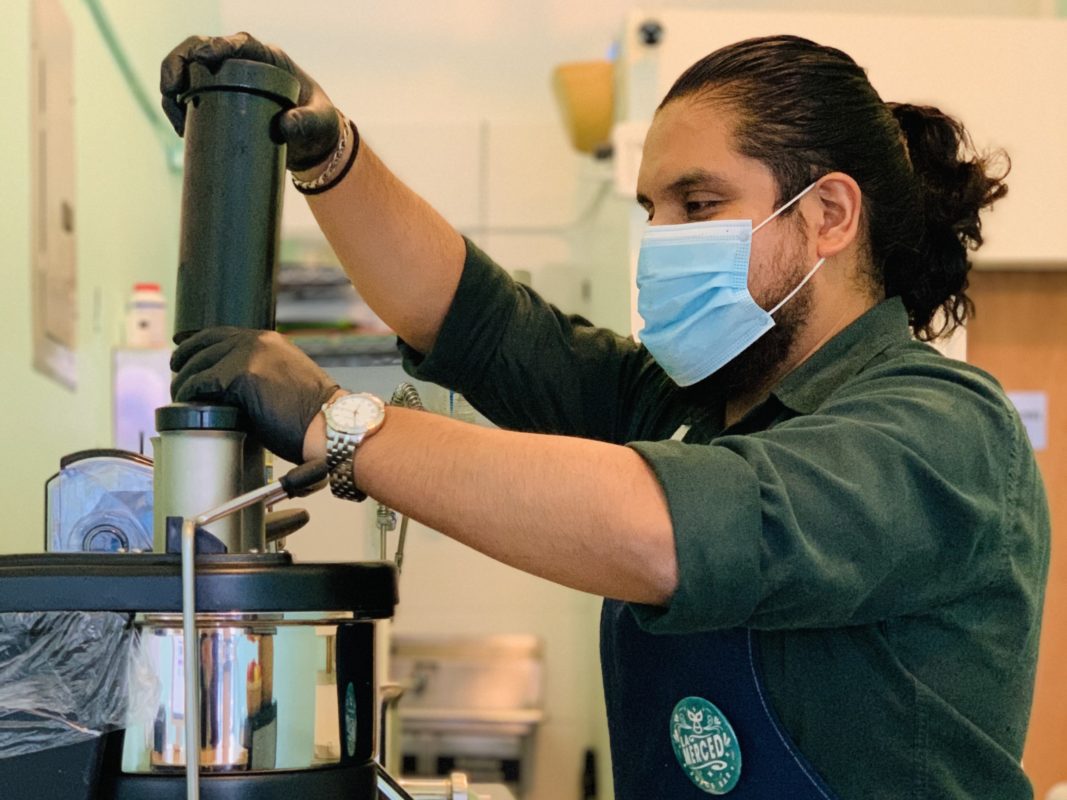
The luchador isn’t the only Mexican icon that inspired Pacheco as he created La Merced: He was also influenced by Mexican shamans. “In Mexico, there’s a ‘shaman’ — a natural doctor,” he explains. “I want to tell someone [who] comes in with a headache, ‘hey, this is good for the headache, you can drink this and that.’ Maybe you feel very weak. ‘You should drink some beet; it’s good for your blood.’”
“The properties of carrots, beets, the green apple, the pineapple, all of it. There’s something for the body that will help you,” he continues, adding that he’s training his staff in nutrition. “That’s why we have the wheatgrass, orange juice, turmeric, ginger…broccoli for your immune system [and] blood….Orange juice with ginger, it’s like an anti-flu,” because it boosts immunity.
The promise of a business based on fortifying health helps to explain Pacheco’s decision to start his first business in the midst of a global pandemic. “I was like, you know what, I’m going to start this because I feel it’s the right time. And I feel it’s the right business to do…. Even if you’re scared, that’s even better.”
But is it a challenge that’s realistic to take on?
“It was extremely difficult for immigrants to run a business [in New York] pre-COVID, so I can’t imagine post-COVID,” says Sam Pierre. Pierre is the founder and owner of SMP Global Consultants, specializing in minority and women-owned businesses, and a professor of entrepreneurship at St. Francis College. To be sure, he continued, “immigrants are figuring out a way around it and thriving. But that doesn’t mean it’s not hard.”
Pierre breaks it down: To start a successful business, you need to identify potential target audiences. For a juice bar, like La Merced, Pierre suggests the hypothetical ‘revenue streams’ of online shoppers, health influencers, students, and gym-goers.
Assuming a second (or third or fourth) wave hits the city, “the school is out, the gym is out. Now we lost two revenue streams,” she says. That doesn’t mean it’s over, necessarily, but it shows how the pandemic can compound what is already a difficult endeavor.
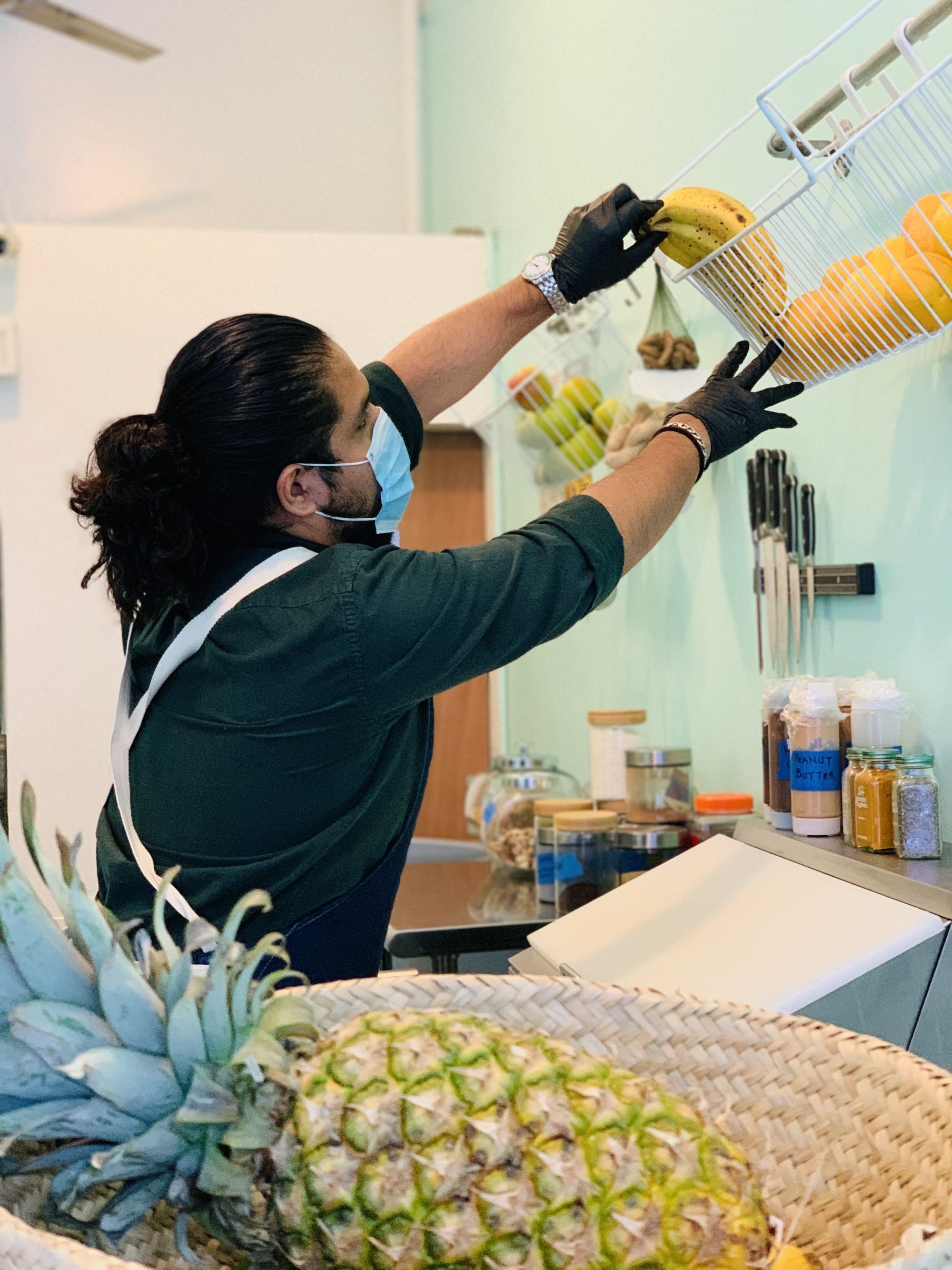
More than two thousand small businesses in New York have closed amid the pandemic, according to data from Yelp, cited in the New York Times — although how many are likely gone for good is difficult to know, according to Haro.
What she definitely does know, however, is that immigrant and family-owned businesses are among the hardest hit by COVID-19: “The mom and pop shops,” she sighs.
Asked what she would tell immigrant new business owners, Haro, also a Latinx immigrant, said, “That they’re not alone.”
Pacheco seems to have already figured this out. He “always makes people feel at home and a part of a team,” Rincon says of Pacheco’s leadership style.
The La Merced team assembled mid-quarantine when Pacheco initially sought assistance from Rincon, who’s from Patzcuaro, a small town in Michoacan, Mexico. She helped establish their posh Instagram presence and newly implemented delivery service, both of which are essential to succeeding amid a pandemic, Pierre says.
Pacheco now employs four people total: Rincon, Veronica Ramirez, Alejandra Gonzales, and Wilbert Abdon, the latter three of whom make up La Merced’s ‘cocktail team.’ Everyone on staff is Latinx: Gonzales and Abdon are from Mexico and Ramirez from El Salvador.
Pacheco is also passionate about giving back to his new neighborhood. Each week, he brings fresh fruit to the Greenpoint Community Fridge, from which neighbors in need of nutrition can take anything they need.
“We want to provide health,” Pacheco says.
A month after opening, La Merced’s business is booming, thanks to loyal Greenpointers: hipsters, influencers, and old-school locals alike. And Pacheco is so enamored with Greenpoint he’s now a self-proclaimed “Brooklyn person,” already seeking an apartment in the area.
Even Rincon, who was initially skeptical, says, “I actually feel more confident [a month in] because Ricardo and the team are doing what they love…People can taste it on the juices [and] feel it when they go to the juice bar and talk with Ricardo or other members of the team. The fact that Ricardo is very welcoming and warm and that is very, very proud of his Mexican roots makes people want to come back.”
Pacheco may not see it himself, but there is something of the luchador-shaman in him as he strives to become one of the nutritional-superhero icons he so admires.
“If you want to get something, you’ve got to go for it. Even though it’s scary, even though it’s hard, it’s worth it at the end,” Pacheco says of what he’s learned opening a business during a pandemic. “Even if you fail, it’s fine…. Life is like that, and that’s the beauty of life.”




